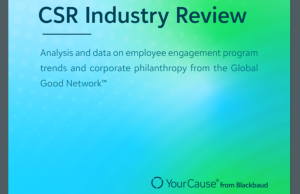A movement toward more salary transparency will get a significant boost when a new regulation in the nation’s largest city goes into effect, with similar measures advancing around the county.
An amendment to the New York City Human Rights Law (NYCHRL) will require that employers — including nonprofits — include the minimum and maximum starting salary for any “advertised job, promotion or transfer opportunity,” effective May 15. The law covers full-time and part-time employees and employers with four or more employees, or one domestic worker.
New York’s State Senate and Assembly have proposed similar legislation around wage transparency in addition to legislatures in Maryland, Pennsylvania and Washington. The Legislative Committee of the Board of Legislators in Westchester County, adjacent to New York City, recommended similar legislation in March. Some states already require disclosure around salary upon request by an applicant.
The proposal has the same goals to combat gender- and race-based pay gaps that “we know exist and we know exist in the nonprofit sector,” Jan Fisher, executive director of Nonprofit Westchester, said in a telephone interview with The NonProfit Times. In terms of impact, she said it’s hard to say given that it’s “such an unpredictable job market,” but she expects Westchester’s nonprofits to get behind it and “when it’s legislated, they will have no choice.”
Nonprofit Westchester has an equitable contracting task force that’s focused on living wages. “Leadership here is very committed to supporting the nonprofit workforce to make a livable wage and be able to live in the communities they serve.”
Implementation can always take time but Fisher thinks Westchester nonprofits will embrace it “after the pain-in-the-neck administrative issues get resolved. Any change requires more work and diligence. For nonprofits who don’t really get reimbursed for administrative costs and other things, I think that’s where the frustration is going to be. It’s another level of administration they’ll have to go through to implement,” she said.
At New York City-based Children’s Aid, head of Talent Management and Human Resources Robyn Dietz doesn’t expect the new regulation to change that much. “We’re really limited in what we can do in terms of salaries,” she said.
Children’s Aid has many federal contracts in early childhood programming and develops a scale based on that, which also affects union employees. There are between 1,110 and 1,200 full-time employees in addition to as many as 700 part-time employees at seasonal peaks who are mostly city-funded afterschool or community center and summer programs. City contracts pay a set hourly dollar amount for part-time staff.
“Turnover everywhere is really high,” Dietz said. In social services, there are always challenges recruiting, same as peer agencies and direct service work.
People comparing pay is always an issue but not one that Dietz is concerned about. “Quite honestly, we have to do that all the time,” she said. Sometimes the job market changes and people who have been there a long time might have to be brought up in salary. “It’s not anything to do with this new law.”
Others in New York City’s nonprofit sector expect the potential for resentment when employees within the same organization realize the disparity in compensation among similar positions.
Fisher said it’s very possible the new measures could create resentment – and she’s hoping that happens. “Employers need to be equitable whether it’s due to gender and race or whether due to other issues. It’s a good thing to have this level of transparency. It’s really up to the organization, whether they see it as a necessary checks and balance, Big Brother – or Sister – or see it as a way to advance more equity in the workplace,” she said. “As nonprofits are concerned about equity, they will come on board, I hope.”
Kevin Dean sees the potential for resentment not as a salary transparency issue but a culture problem. “If you’re worried that other staff are worried about pay, you need to restructure your organization, your salary and benefits for staff,” he said. “I don’t think that’s the problem of applicants and current employees; that’s a management problem that needs to be addressed before you even start posting these jobs.”
When Dean became CEO of Momentum Nonprofit Partners in 2017, he wanted the organization to be competitive and a model for other nonprofits. He instituted a starting salary of $60,000, including an office manager position that previously earned $15 an hour. “She was confident and capable already. I know we’ve got her as long as possible and we have great benefits and pay her well. I think that’s something that everyone should embrace,” he said. “It goes beyond salary transparency, it’s a symptom of a bigger problem around pay, benefits, culture and nonprofits.”
Dean has a “heart for small nonprofits” but also realizes they often try to scale up too quickly. If an organization is paying someone $21,000 a year, they’re living in poverty like the clients they serve and that position might be better off as a part-time post, he argued. “It’s about strategic planning, getting your ducks in a row and having a solid fundraising plan before you jump into having salaried employees.”
The 650 nonprofit members of the Memphis, Tenn.-based nonprofit formerly known as the Alliance for Nonprofit Excellence can post job listings for free. However, in 2019, Momentum instituted a policy that it would not post any jobs of less than $15 per hour or without a salary range.
“We still get organizations that argue with us and try to get it [job listing] into the back door through a staff member,” Dean said. He recalled one major funding who’s sent a job position without a salary directly to him asking to send it out. “Fortunately, they didn’t give me a hard time,” Dean said. On the other hand, they’ve received “lots of notes of gratitude from job seekers” about those policies. Momentum’s staff also has been supportive of it. “The more we’ve talked about it, the more people have understood it, especially from a racial, gender pay parity framework,” he said.
“We think we need to normalize competitive salaries in nonprofits,” Dean said. “It’s over time talking about consistently paying people. Whether you’re a small organization or not, structure your organization in a way that competitively pays employees,” he said.
“The more states that have this conversation, the more it will filter down,” Dean said. “This is good for everybody – businesses and employees – to be transparent about their salaries.”










